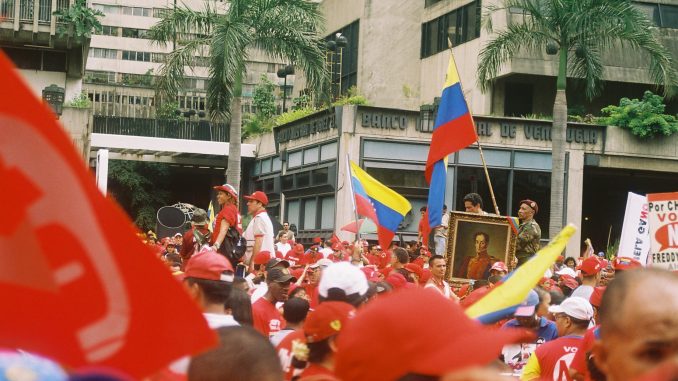
Accusing the national election board (CNE by its Spanish initials) of “Gigantic Fraud,” opposition leaders this morning called for the population to protest the results in the streets! After an exhausting day of long voting lines in the heat, and a night of rainstorms, and Chavista firework celebrations there were few in Caracas who heeded the call.
Much of the people’s trust in the system of voting is dependent on the international observers present in large numbers all over the country yesterday. The two principal organizations overseeing the vote were The Carter Foundation and the Organization of American States (OEA by its Spanish initials).
Finally this afternoon the heads of both organizations gave their blessing to the result in a press conference at the Grand Melia Hotel in the Sabana Grande district of Caracas. From the podium, former U.S. President Jimmy Carter spoke briefly. To his credit, he gave his speech in Gringo Spanish; some English-speaking journalists asked him to repeat the short speech in English but he gracefully declined. Beginning by congratulating the Venezuelan people on their fabulous turnout the previous day, Carter went on to say that The Carter Foundation had been present for the electronic downloading of the more than 3000 regional machines used to count the votes. Carter also added that his organization and the OEA had conducted a “quick poll,” a mechanism that he assured the audience had been accurate elsewhere in Latin America. Both quick polls had tallied closely with the CNE’s results of 58% against the recall and 42% for the recall. Carter also made a point of adding, this time in English, that The Carter Foundation’s results were similar to those of Sumaté, a U.S. funded Venezuelan group, whose exit polls , the opposition had used to accuse CNE of fraud.
More than eight and a half million Venezuelans, of fourteen million on the voting roles, turned out yesterday to vote in the recall referendum. An unprecedented one million more voters than took part in the original election caused huge delays but the people waiting in long lines to vote demonstrated good humor with songs of “We want to vote.”
A small demonstration of anti-Chavez opposition groups, and at least as many police as well as members of the press, were at the gates of the Gran Melia to protest the Carter Foundation and OEA announcement. Taunted by passing traffic honking their horns to the tune of “Uh, Ah, Chavez no se va!” (Chavez will not go!) one distraught woman shouted more accusations of fraud through a bullhorn. Among them, she shouted that “[the Venezuelan opposition] have lost [the recall referendum] because of oil.”
Her comments, though unproven and probably false, allude to the fact that oil prices dropped today on futures markets in both London and New York. On Friday, both markets had recorded the highest prices ever for futures on the barrel for September. A small proportion of the risk associated with the price rises can be attributed to uncertainty as to Venezuela’s supply should Chavez have been recalled. Other factors include low reserves worldwide, supplies at only 50% of the norm in Iraq due to insurgent sabotage and the ongoing wrangle for power between recently privatized Yukos executives and Russian President Putin. Though an opposition defeat of Chavez would most likely have lead to the breakup and privatization of the national oil firm PDVSA, current production levels both in OPEC and elsewhere are at close to maximum and any further destabilization threatens to send oil prices through the roof.
From the balcony of his Miraflores Presidential Palace last night, Chavez was jubilant. Vowing to accelerate his progressive reforms with oil revenues taken directly from his special fund in the PDVSA he said “Hopefully, from this day on Washington will respect the government and people of Venezuela.”

Leave a Reply